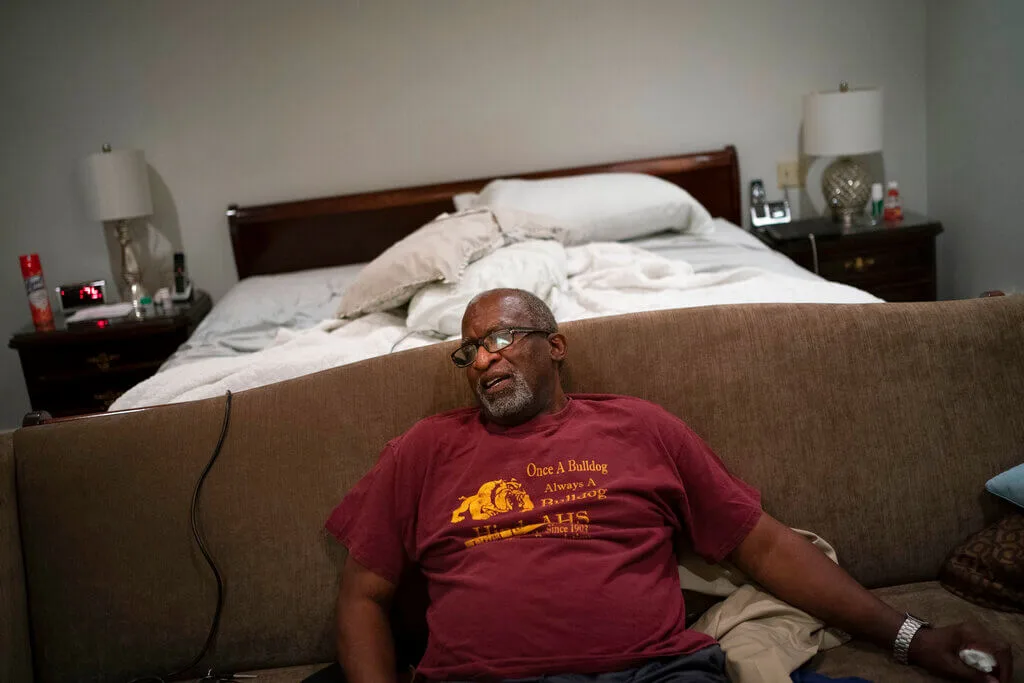
Mike Bishop sits in his bedroom on Thursday, Oct. 8, 2020, in Byram, Miss. In early July, Bishop was hit by COVID-19. Bishop was living alone at home, in a big suburban house. He'd wake up confused at 2 a.m. when Bonnie Bishop, his wife, wasn't beside him. (AP Photo/Wong Maye-E)
With COVID-19 cases surging across the country, chances are you might know someone who’s sick with the virus. Protect yourself while offering those close to you some much-needed care and comfort.
The US saw 1,502,350 new coronavirus cases from Dec. 17-24. According to the Centers for Disease Control and Prevention, the total number of cases is above 18 million and counting. As the pandemic’s holiday surge continues, it’s becoming more and more likely that someone close to you has or might contract COVID-19.
It’s only natural to want to help family and friends stricken with the illness, but self-preservation—and doing your part to control the spread—demands safeguarding your own health. The good news is you can do both.
Sort Fact From Fiction: Sign up for COURIER’s Newsletter
Chances are, the relative or friend is feeling isolated and rather anxious. Their appetite is likely low, either from the loss of taste and smell senses or due to gastrointestinal issues caused by the infection, and they may have developed a fever or wet cough. You can help by checking in, lifting their spirits, and providing support for their basic needs–all from the recommended social distance.
Be Their Personal Assistant
Stacey Rose, a respiratory therapist based in Charlotte, N.C., recommends calling sick friends and family members to keep them on schedule. “If they have a fever, call and make sure they’re taking Tylenol every four hours,” she suggested. Viral infections such as COVID can quickly lead to dehydration, so Rose says to remind loved ones to drink fluids regularly so they stay hydrated. “And eating will help, so push them to eat even something small, like a piece of fruit.”
Take Something Off Their Plate by Feeding Them
Food is often not a top priority for people suffering from a bout with Covid. The CDC has a list of wide-ranging symptoms, including fatigue, loss of taste or smell, nausea or vomiting, and diarrhea. They are under quarantine, so going out to the grocery store is not recommended. If they have an appetite, they may be too tired to prepare balanced, healthy meals. You can alleviate this issue by food shopping for them and dropping the groceries off at their door or having a delivery service transport the items. You can also drop off home-made dishes for them. Not only will you help make sure they eat, but you’ll lift their spirits in the process.
Babysit Their Fur Babies
Covid-sick people may be struggling to meet emotional obligations. It may also be difficult for them to isolate themselves from a beloved pet within the household. If they have animals, consider pet-sitting for them. The risk of animal-to-human transmission is deemed to be low, but people can spread it to animals. If you take over the care of a pet, limit their contact with other humans and animals. The CDC says there’s no evidence that pets can transmit COVID-19 via their hair or fur, so do not bathe them or wipe them down their fur with disinfectants, alcohol, or hand sanitizer. Keep cats indoors and walk leashed dogs at least six feet away from others.
Take Care of Their Errands—Safely
When Alison McBride of Stone Ridge, New York, contracted COVID, the single parent still had to take care of her three young sons. Her mother, who lives next door, has a heart condition called atrial fibrillation that makes her extra cautious of contracting the virus. So instead of grocery shopping and then bringing the groceries inside, McBride would order groceries online, and her 74-year-old mother would pick them up and drop them off on the porch. At times, though, she did have to come inside to help.
“Mom got an N-95 mask and wore another mask underneath that the way medical workers do,” McBride said. “Anytime she touched anything of mine, she wore gloves and was very careful to sanitize it.”
And when McBride developed complications and needed to go to the emergency room, her mother suited up in a hazmat suit to drive her.
Her best advice as someone who lived with COVID-19: “Sanitizing works!”
Politics

Influencers and creators find new ways to engage young Philadelphia voters
Rec Philly, a space for creators and influencers, teamed up with Show Up Strong to get hundreds of young Philadelphia residents engaged in the...

New Biden rule protects privacy of women seeking abortions
Under the new rules, state officials and law enforcement cannot obtain medical records related to lawful reproductive health care with the goal of...

Biden marks Earth Day by announcing $7 billion in solar grants
The Biden administration on Monday announced the recipients of its Solar For All Program, a $7 billion climate program that aims to lower energy...
Local News

Conjoined twins from Berks County die at age 62
Conjoined twins Lori and George Schappell, who pursued separate careers, interests and relationships during lives that defied medical expectations,...

Railroad agrees to $600 million settlement for fiery Ohio derailment, residents fear it’s not enough
Norfolk Southern has agreed to pay $600 million in a class-action lawsuit settlement for a fiery train derailment in February 2023 in eastern Ohio,...





